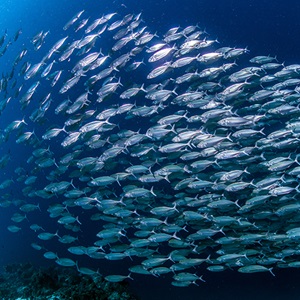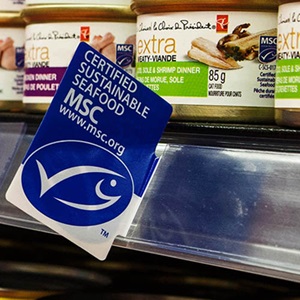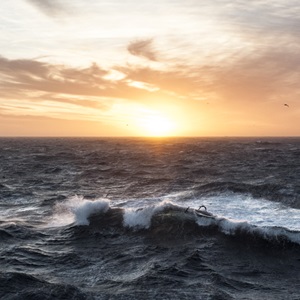The Empowering Consumers Directive aims to prevent greenwashing and give European consumers the tools to make informed choices.
What is the Directive?
The Empowering Consumers Directive (ECD) is part of The European Union’s Green Deal, which is introducing new laws aimed at eliminating unsubstantiated claims in the EU market. It comes into effect on 27 September 2026.Why is it important?
The Directive amends the Unfair Commercial Practices Directive to tackle misleading environmental claims and prevent “greenwashing". It will prohibit the use of sustainability labels that are not backed by certification schemes which meet specific criteria, including third-party verification. This will help consumers make more informed purchasing decisions.What does the Directive mean for the MSC and its partners?
The MSC welcomes the new rules. We are an ISEAL Alliance member and comply with the ISEAL Code of Good Practice for Sustainability Systems – a globally recognised framework that defines best practices for credible sustainability systems and claims.
ISEAL’s analysis shows that its Code and Credibility Principles align closely with the ECD’s objectives: enhancing trust, transparency, and accountability in environmental messaging. This positions the MSC to support businesses in meeting ECD requirements and to respond to consumer demand for trustworthy sustainability information.
Watch our webinar
In November 2025, we held a webinar to discuss evolving EU legislation, changes to the MSC sustainability claim, and what this means for our partners who use the MSC ecolabel.
How does the MSC program meet the ECD Certification Scheme Requirements?
Requirement 1
Definition:
"A third-party verification scheme that certifies that a product, process or business complies with certain requirements, that allows for the use of a corresponding sustainability label, and the terms of which, including its requirements, are publicly available."
How the MSC complies:
The MSC is the only wild capture seafood assurance program that simultaneously meets best practice requirements set by the UN Food and Agriculture Organisation (FAO) Code of Conduct for Responsible Fisheries and is independently evaluated against ISEAL’s Code of Good Practice.
The MSC is a third-party verified certification program. It does not certify fisheries itself but sets the standard that fisheries must meet to be MSC certified. Independent, accredited Conformity Assessment Bodies (CABs) conduct assessments using expert teams in fisheries science and management, independent of both the fishery and the MSC.
Find out more about how we meet best practice
In addition to our Fisheries Standard, the MSC Chain of Custody Standard provides assurance that all seafood sold with the MSC label comes from a certified fishery.
Requirement 2
Definition:
"The scheme is open under transparent, fair, and non-discriminatory terms to all traders willing and able to comply with the scheme’s requirements."
How the MSC complies:
As an ISEAL Alliance member MSC follows the ISEAL Code of Good Practice. The MSC program is open to any fishery or supply chain company that meets the requirements of MSC's Fisheries and Chain of Custody Standards.
All Fisheries with MSC certification are listed online, as are all companies holding Chain of Custody Certification.
Requirement 3
Definition:
"The scheme’s requirements are developed by the scheme owner in consultation with relevant experts and stakeholders."
How the MSC complies:
MSC develops its standards through a multi-stakeholder process involving fisheries, Chain of Custody certificate holders, NGOs, and industry experts. This is underpinned by rigorous governance structures including the Technical Advisory Board and Stakeholder Advisory Council.
Find more details on our governance page
The MSC Standard reviews align with best practice codes and guidelines from the UN Food and Agriculture Organization (FAO), ISEAL and the Global Sustainable Seafood Initiative (GSSI). These reviews engage academics, NGOs, governments, and industry experts.
Requirement 4
Definition:
"The scheme sets out procedures for dealing with non-compliance with the scheme’s requirements and provides for the withdrawal or suspension of the use of the sustainability label by the trader in case of non-compliance with the scheme’s requirements."
How the MSC complies:
MSC has clear rules for addressing non-compliance. Certification may be suspended if standards are not upheld, or progress against conditions is insufficient. Non-conformities are identified by the CAB, which determines whether issues can be remedied. If a certificate is suspended or withdrawn, the MSC label can no longer be used.
To help to ensure the integrity of the program, the MSC also has a complaints process and a mechanism to report misuse of its name or label.
Requirement 5
Definition:
"The monitoring of a trader's compliance with the scheme’s requirements is subject to an objective procedure and is carried out by a third party whose competence and independence from both the scheme owner and the trader are based on international, Union or national standards and procedures."
How the MSC complies:
MSC Certification is based upon independent third-party audits conducted by Conformity Assessment Bodies (CABs) accredited by Assurance Services International GmBH (ASI).
ASI is an independent organisation overseeing over 85 CABs in more than 150 countries, ensuring consistent performance. CABs comply with international standards, including the ISO 17065 standard as set out in the ECD.



